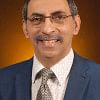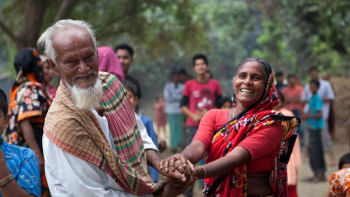Bangladesh needs to do better for its elderly

These days, I frequently see elderly people pulling rickshaws or sleeping on the footpaths at night. And my heart breaks with sadness. As per the Population and Housing Census, 2022, over 15.3 million Bangladeshis are aged 60 years or above, which constitutes 9.28 percent of the total population—an increase from 7.48 percent in 2011. With the elderly population growing fast and projected to reach 18 percent of the country's population by 2050, their needs in terms of housing, food, healthcare, financial services, are expected to be enormous.
However, there is very limited targeted support available for the ageing population of Bangladesh. Globally, the older people are called senior citizens and they receive various support and benefits. The government introduced a monthly allowance for disadvantaged elderly people back in 1998, which still exists today. At present, about 5.8 million people—men aged at least 65 years and women aged at least 62—receive a monthly allowance of Tk 600 per month.
The Universal Pension Scheme, enacted in August 2023, has the potential to support our senior citizens. But we need to wait and see how effective it can be in the long run. It will allow people aged between 18 and 50 years to put aside a part of their income and receive a monthly pension at the end of their payment period. However, this will benefit the older population of the future, not those who are in this age group at present. As of October 22, 2023, about 15,000 people registered for the pension fund and deposited Tk 12.54 crore. The government has invested Tk 11.31 crore in 10-year treasury bonds from this amount.
The National Policy on Older Persons 2013 considers people above 60 years to be senior citizens, in line with the UN World Assembly on Ageing in Vienna held in 1982. It commits to promote the participation of older persons in decision-making and policy formulation, increase employment opportunities, promote health, affordable housing and transportation; addressing the needs of older persons in humanitarian situations, disaster relief programmes, and during collection of statistical data. However, the policy has not been adequately promoted and thus, its achievements are few.
While we know that, in the developed world, there are a variety of support mechanisms available for senior citizens, in many developing countries, the elderly people are also well regarded and enjoy separate benefits. In India, for example, senior citizens are offered a higher interest rate on their bank deposits and receive personalised banking services when needed. There is also a separate queue for the elderly at banks and in hospitals. Indians aged 60 years and above are entitled to specific tax benefits, including higher tax exemptions and lower tax rates. Since the elderly are more prone to illnesses and require regular medical check-ups and treatment, a range of health insurance schemes are available to cater to their specific needs.
Public buses and trains in India also offer highly subsidised rates to senior citizens, of up to 50 percent of the regular fare. They are also allotted the lower berths on trains and can avail wheelchairs from the train stations. Several states in India also offer property tax exemptions to senior citizens. All these benefits immensely help the elderly population in India. The various benefits elderly Indians receive are legally supported by the Maintenance and Welfare of Parents and Senior Citizens Act, 2007.
Meanwhile, a high proportion of the Malaysian population has reached the age of 60 years or older. Elderly Malay citizens receive a number of healthcare benefits, such as free and comprehensive health services and medicines in public hospitals and health centres, including free dental care. Pension funds and provident funds are mandatory retirement funds for employees in both the public and private sectors. Just as in India, senior citizens in Malaysia enjoy a 50 percent discount on public transport and also receive a 50 percent discount on passport processing fees.
In Bangladesh, there are many significant gaps when it comes to the need to expand the support mechanism for our senior citizens. Millions of elderly people still have to work and earn their own livelihoods. The provision of old-age allowance is not nearly adequate to cover the increasing costs of food, housing, and healthcare. As such, authorities should seriously consider providing the elderly population with free access to health services, subsidised travel opportunities in public transport, provision of higher interest rates from banks, and food rationing. As is our tradition, we regard the elderly in high esteem. But we need to make this attitude a reality by offering them various benefits. The joint family system is slowly dying out, and can no longer be relied upon to ensure support for the older population. So, the government must come up with other mechanisms to assist our elderly in leading decent lives. A legislation would be the first step towards achieving this objective, followed by framing related guidelines for different institutions.
Dr Nawshad Ahmed, an ex-UN official, is an economist and urban planner.
Views expressed in this article are the author's own.
Follow The Daily Star Opinion on Facebook for the latest opinions, commentaries and analyses by experts and professionals. To contribute your article or letter to The Daily Star Opinion, see our guidelines for submission.

 For all latest news, follow The Daily Star's Google News channel.
For all latest news, follow The Daily Star's Google News channel. 











Comments